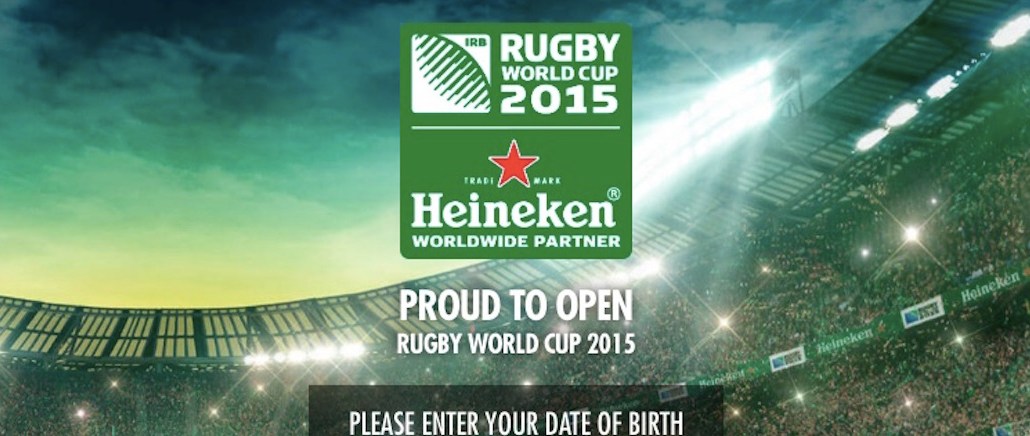
Brands are getting feisty on social media as intensity builds ahead of the Australia-New Zealand Rugby World Cup final on Saturday in London.
For example, Air New Zealand and Australia’s Qantas spent today engaged in light-hearted, nationalistic bickering on social media. Air New Zealand tweeted a digitally altered a photo of a Qantas plane painted black with slogans such as “team All Blacks” and “simply the best.” “We’ve been thinking about this wager. How about you paint your planes like this?” the airline said.
Qantas responded with an image of an Air New Zealand plane in bright Australian gold, saying “think it needs a golden touch.” The social media exchange has ended with a wager based on the outcome of the final. If the All Blacks win Qantas crew will have to wear New Zealand rugby jerseys on Monday, and if Australia wins, Air New Zealand pilots will have to announce Australia’s win.
The back and forth is emblematic of how brands have taken to infiltrating live sporting events, which are one of the few media opportunities to still draw mass attention.
Helle Tyllesen, director of customer strategy at social media engagement monitoring firm Falcon Social, has advice for brands with plans for big events: Keep it simple. “Focus on captivating visuals — it’s absolutely crucial,” she said.
Digiday has taken a look at what’s been working for two primary RWC sponsors, MasterCard and Heineken, and how non-sponsor Guinness is holding its own.
Heineken
Unsurprisingly, primary sponsor Heineken has generated the most consistent levels of social media engagement among brands leading up to Sunday’s match, according to Falcon.
The Heineken Rugby Studio is a digital review show created solely for social channels. Hosted by former England team captain Will Carling the content features celebrities and presenters such as Piers Morgan, Steve Jones, along with rugby stars including former New Zealand rugby union player Jonah Tali Lomu. Separate videos are cut for Twitter, and people are encouraged to tweet questions for the stars to answer via #itsyourcall as a way of keeping them engaged with the brand throughout the tournament.
Watch the #RWC2015 final with a Legend on Twitter! Tweet Jonah Lomu your questions to @Heineken with #ItsYourCall https://t.co/rcfinxALWo
— Heineken (@Heineken) October 29, 2015
MasterCard capitalizes on viral hit. MasterCard will have to summon something pretty special this weekend if it’s to top last week’s social traffic. The brand saw social media engagement spike last Thursday during the semi final between Argentina and Australia after it posted a photo of the fans on the Australia side at an earlier match. One of those featured in the photo wrote a comical letter blaming the post for ruining his relationship.  MasterCard penned the following response.
MasterCard penned the following response. 
It was so successful that it momentarily led the social charts and raised speculation that it was staged by MasterCard. Although the story broke on Facebook, Falon Social said 94 percent of engagement happened on Twitter, that site being a more natural place for conversations using hashtags.
A MasterCard spokesperson said the incident was “very much coincidental” and “a good example of how unexpected human interest-type stories can blend in with a campaign and get organic pickup in social,” he said.
Guinness Thanks to Heineken’s lock on the rugby championships’ beer sponsorship, Guinness has had to go guerrilla. It has produced a lot of reactive content, rather than taking a more planned approach. For example, it rushed out a lot of content when Japan had a surprise win to capitalize on the wave of interest around it.
Japan makes Rugby history Drinkaware.ie pic.twitter.com/pJ8HV2HHb5 — Guinness Ireland (@GuinnessIreland) September 19, 2015
It seems to have worked if Falcon’s data is anything to go by. The social firm claims Guinness outperformed most sponsors in terms of engagement, at times putting it “almost on a par” with Heineken.
Much of this success was driven by a video series seeded on social platforms, featuring former rugby champions such as England’s Jonny Wilkinson. Here’s one that ran on Twitter.
Humility and determination can win the hearts of nations. — https://t.co/VPjOAZ06RC https://t.co/8QrDtXkx5S
— Guinness Ireland (@GuinnessIreland) August 22, 2015
Its “Never Alone” video (below) told the story of former Wales captain Gareth Thomas, and the personal challenges involved with being a high-profile, gay rugby player. On YouTube it has gotten over 450,000 views.
More in Marketing

WTF are tokens?
When someone sends a prompt or receives a response, the system breaks language into small segments. These fragments are tokens.

AI is changing how retailers select tech partners
The quick rise of artificial intelligence-powered tools has reshaped retailers’ process of selecting technology partners for anything from marketing to supply chain to merchandising.

YouTube’s upmarket TV push still runs on mid-funnel DNA
YouTube is balancing wanting to be premium TV, the short-form powerhouse and a creator economy engine all at once.






